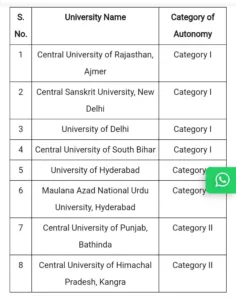The University Grants Commission (UGC) has recently made a significant decision to grant autonomy to eight central universities in India, and this includes the prestigious Delhi University. This move is aimed at elevating the quality of higher education by providing these institutions with greater flexibility in academic, administrative, and financial matters.
The autonomy is categorized into two levels. Category I autonomy is the highest level, granting universities the independence to determine their own curriculum, fee structures, and admission processes. This level of autonomy empowers these universities to make decisions independently, ensuring a more dynamic and self-governing educational environment.
On the other hand, Category II autonomy offers a degree of flexibility, albeit with certain limitations set by the UGC. While not as extensive as Category I, this level still allows universities to have some control over academic and administrative aspects, providing a balanced approach to autonomy.
This decision by the UGC is expected to bring about significant changes in the Indian educational landscape. The universities granted autonomy will likely see more diverse and innovative academic programs, improved governance, and enhanced research opportunities. Overall, this move reflects a commitment to advancing the quality of higher education in India by empowering universities to make independent and strategic decisions.






